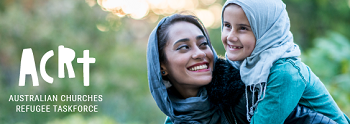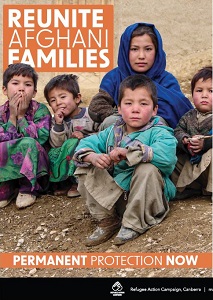
Spotlight on immigration detention
Australian Churches Refugee Taskforce (ACRT) is an activity of the National Council of Churches in Australia (NCCA).
We believe our faith calls us to welcome the stranger and care for the people who find themselves displaced, marginalised or homeless, and those in need of protection. We want to see a compassionate and generous response to welcoming refugees into Australia.
The ACRT has long called for the Australian Government to end mandatory detention of asylum seekers, refugees and noncitizens including the ending of offshore detention, in favour of seeking community alternatives to immigration detention wherever possible.
There are high levels of mental health problems among people who have legitimate claims for protection, which are further exacerbated by the detention experience itself.
A number of ACRT members work in church-based organisations which offer care and support for refugees and asylum seekers in the community. They regularly share stories of people who are destitute, unable to obtain access to safe housing, adequate food and other basic services. We have advocated to the Government that people in community alternatives to immigration detention should be cared for, have full access to housing and financial support and have the right to work and to access education, health care and other government services to keep them from homelessness and impoverishment.
What Tennis champion Novak Djokovic’s brief detention in a hotel in Melbourne reminded Australians is that immigration detention is arbitrary and can be changed by a decision of the Minister.
Through the media spotlight Australians have also learned that immigration detention by Australia can be indefinite. Some refugees and asylum seekers in Melbourne’s Park Hotel have been in offshore and onshore detention for up to 9 years. Others are in hotels in Brisbane and Darwin with the total number being held in hotel detention believed to number over 60.
We are pleased to see the continuing high priority that the new Australian Human Rights Commissioner, Lorraine Finlay, is placing on Australia’s immigration detention system.
In a recent opinion piece on the ABC website Commissioner Finlay said:
“Hotels are simply not appropriate places to detain people for extended periods. The hotels used for immigration detention have been found to lack dedicated facilities for exercise and recreation, there is often limited access to fresh air or outdoor space, and there have been media reports of maggoty food. The human rights and health impacts of hotel detention are serious and well-documented, including by the Australian Human Rights Commission.”
Finlay said Australia made an international commitment to embed a coordinated and independent inspection system for all places of detention in 2017, but four years on from ratifying the protocol, it had failed to do so by the deadline of 20th January 2022.
What can you do?
Write to your Local MP and the Minister for Immigration and Minister for Home Affairs to tell them that you want Australia to end mandatory onshore and offshore closed immigration detention and that community detention of refugees and asylum seekers must allow access to education, work and housing support.
Contacting the Minister for Immigration, Citizenship, Migrant Services and Multicultural Affairs
Contact: The Hon Alex Hawke MP
or complete the online contact form
Contacting Members of Parliament
Afghan refugee announcement falls short
In response to the Afghanistan crisis, the Australian Government has committed to only 10,000 humanitarian and 5,000 family reunion places over four years, despite calls for 20,000 additional places in 2022.
The allocation is even more disappointing when considering the 10,000 places will be taken from Australia’s current refugee and humanitarian program, which was cut by 5,000 places a year from 2020. Given the scale of need and the generosity of Australian responses to past crises, this allocation is insufficient, with Australia missing an opportunity to provide safety and leadership at a critical time.
Refugee Council of Australia (RCOA) set out the impacts of the Government’s announcement in their Media Release:
“Today we learn that visas for the 4300 Afghan nationals evacuated from mid August will not be part of any additional commitment, as was widely expected. This means there will be fewer than 11,000 refugee and family visas over the next four years for those not part of the evacuation process.
“In just five months, Australia has received applications from more than 145,000 Afghan nationals in desperate circumstances. What is clear now is that very few of those people have any hope of building a life of safety in Australia.”
Ahmad Shuja Jamal, a special advisor to RCOA who was a senior official in the government of Afghanistan prior to the Taliban takeover in August, said Australia was missing an opportunity to have a positive impact in the region with its greatly delayed and deeply inadequate response.
“Urgent and immediate action at scale is required to protect Afghans under threat. There is no time to waste: Taliban are intensifying their crackdown on women, minorities and those who oppose them by the day,” Mr Jamal said.
“Australia’s refugee resettlement policy is not just about Australia: it can send powerful signals to countries bordering Afghanistan to be more receptive to Afghans seeking safety.
“By announcing numbers that reflect the true scope of the problem in Afghanistan, Australia can show that these countries are not alone in shouldering the responsibility.”
RCOA has renewed calls for the Australian government to provide increased humanitarian aid to Afghanistan, with news of nearly a million children facing starvation.
Mr Jamal said the government has an opportunity to make a real difference to the dire situation by donating to the UN Humanitarian Response Plan.
He also said he knows “the Australian people would want their government to be more generous to people in dire situations such as this one, to avoid a humanitarian catastrophe.”
 Reunite Afghani families in Australia – rally in Canberra
Reunite Afghani families in Australia – rally in Canberra
The Refugee Action Campaign, Canberra is holding a rally in solidarity with refugees from Afghanistan. Please join them if you can.
When: 8 February 2022
Where: Parliament House Lawn
Details: download the flyer pdf Reunite Afghani Families A4 (1.67 MB)












